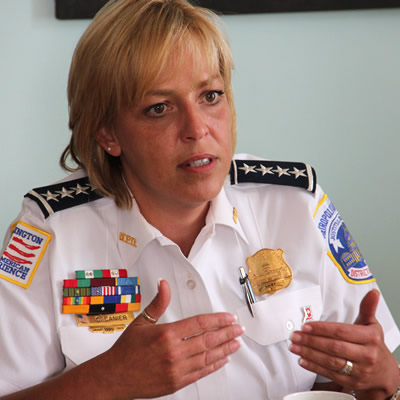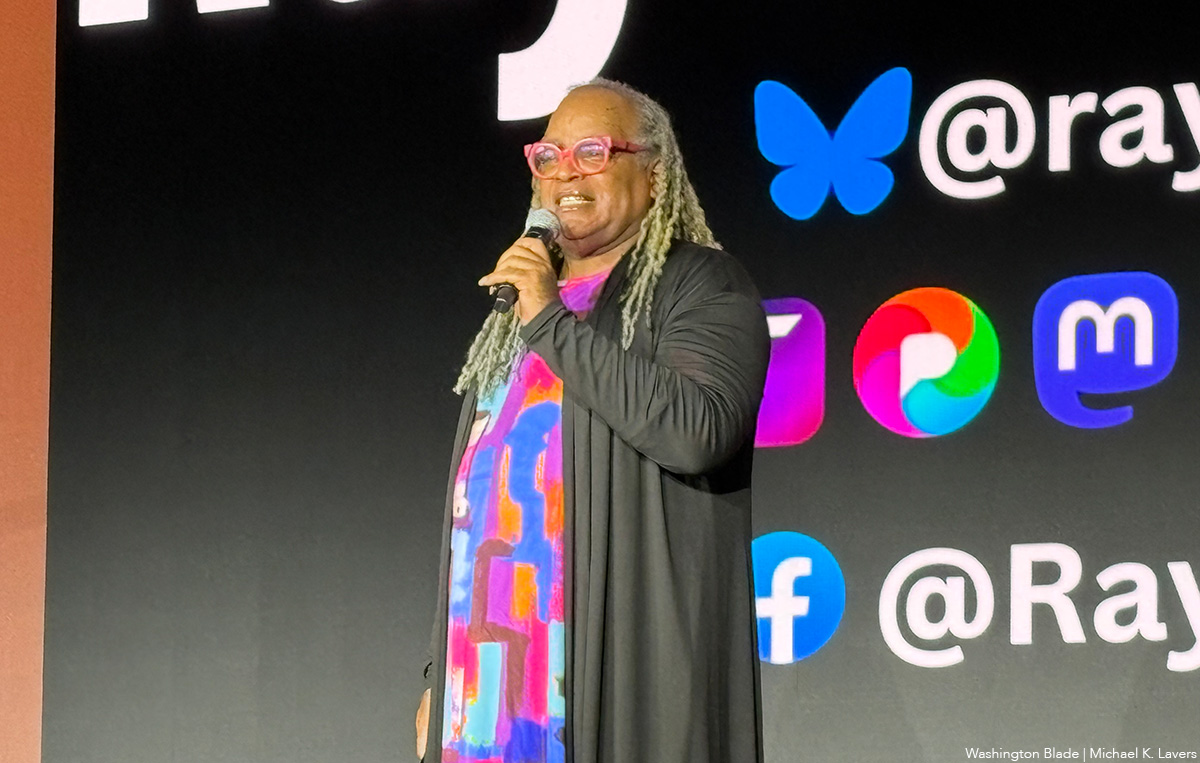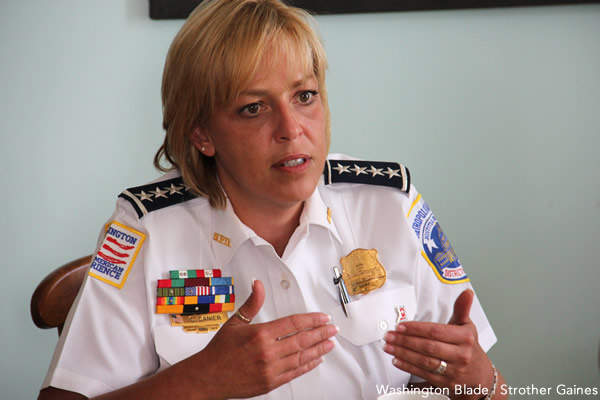Local
D.C. Council holds hearing on hate crimes
D.C. Police Chief Cathy Lanier among those who testified

D.C. Police Chief Cathy Lanier was among those who testified during a D.C. Council hearing on hate crimes and the Metropolitan Police Department’s response to them on Friday.
“As you know, my philosophy is that every member of the department is responsible for stopping crimes and fully addressing all members of the community in any matters relating to hate crimes,” she said. “With this in mind, I continue to emphasize… training and an understanding of the issues relating to hate crimes in the communities in the District that are most frequently affected by them.”
The Judiciary Committee hearing took place less than three days after Ali Jackson, Alvonica Jackson and Desmond Campbell allegedly stabbed a 16-year-old boy in what police have described as an anti-gay hate crime.
MPD statistics indicate that there were 43 reported bias-related crimes based on sexual orientation in 2011, compared to 35 in 2010. D.C. police reported that there were 11 bias-motivated crimes based on gender identity and expression in Washington in 2011, compared to 10 in 2010. MPD statistics further report that the number of reported anti-gay attacks in D.C. between January and May increased 60 percent over the same period last year.
“Washington remains the city with the highest rate of anti-LGBT violence in the nation, and the problem is only becoming worse,” noted Gays and Lesbians Opposing Violence Chair A.J. Singletary during his testimony.
While activists have generally welcomed what they describe as the MPD’s improved outreach to LGBT Washingtonians and other marginalized groups over the last year, they maintain that victims of anti-LGBT bias attacks remain afraid to come forward. GLOV Vice Chair Hassan Naveed and others have previously stressed to the Blade that high profile incidents of police misconduct, such as the officers who refused to take a report of an anti-gay attack against five lesbians outside the Columbia Heights Metro station last July, can dissuade victims from going to the authorities.
Lanier stressed during her testimony that detectives who investigate crimes against people receive specialized training on LGBT-specific issues. She said that “issues relating to hate crimes or serving communities targeted by them” have been incorporated into scenario-based roll call trainings.
“In addition to all of ongoing internal initiatives to ensure high quality interactions with victims in the communities affected by hate crimes, we are constantly engaged with the community to foster open communication,” added Lanier.
D.C. LGBT Community Center board member Holly Goldmann stressed that MPD needs to include local organizations in developing a training program for its Special Liaison Unit and Gay and Lesbian Liaison Unit officers. The Anti-Defamation League, the group that D.C. police has tapped to help bolster the department’s response to hate crimes, announced that it had invited the Human Rights Campaign, the National Center for Transgender Equality, the Leadership Conference on Civil Rights and two university professors to join the Hate Crimes Assessment Task Force.
Council members Jim Graham (D-Ward 1) and Phil Mendelson (D-At Large,) who chairs the Judiciary Committee, both expressed concern that D.C. groups are not represented on the panel. “[These are] great organizations involved, but that can be so much better enhanced by local groups who are really right there and extremely dedicated,” said Graham.
Council members David Catania (I-At Large) also attended the hearing. Jason Terry of the D.C. Trans Coalition and Rick Rosendall, vice president of political affairs of the Gay and Lesbian Activists Alliance, were among those who also testified.
Alvin Bethea read a letter on behalf of the mother of Deoni Jones, a trans woman who was stabbed to death at a Northeast bus stop in February. “This crime was no drug deal gone bad, no feud between rival street gangs, no attempted robber turned victim, no love triangle, no unpaid gambling debt, not even a petty dispute,” read Bethea as he became increasingly emotional. “No nothing but pure hatred.”
Virginia
McPike wins special election for Va. House of Delegates
Gay Alexandria City Council member becomes 8th LGBTQ member of legislature

Gay Alexandria City Council member Kirk McPike emerged as the decisive winner in a Feb. 10 special election for a seat in the Virginia House of Delegates representing Alexandria.
McPike, a Democrat, received 81.5 percent of the vote in his race against Republican Mason Butler, according to the local publication ALX Now.
He first won election to the Alexandria Council in 2021. He will be filling the House of Delegates seat being vacated by Del. Elizabeth Bennett-Parker (D-Alexandria), who won in another Feb. 10 special election for the Virginia State Senate seat being vacated by gay Sen. Adam Ebbin (D-Alexandria).
Ebbin is resigning from his Senate next week to take a position with Virginia Gov. Abigail Spanberger’s administration.
Upon taking his 5th District seat in the House of Delegate, McPike will become the eighth out LGBTQ member of the Virginia General Assembly. Among those he will be joining is Sen. Danica Roem (D-Manassas), who became the Virginia Legislature’s first transgender member when she won election to the House of Delegates in 2017 before being elected to the Senate in 2023.
“I look forward to continuing to work to address our housing crisis, the challenge of climate change, and the damaging impacts of the Trump administration on the immigrant families, LGBTQ+ Virginians, and federal employees who call Alexandria home,” McPike said in a statement after winning the Democratic nomination for the seat in a special primary held on Jan. 20.
McPike, a longtime LGBTQ rights advocate, has served for the past 13 years as chief of staff for gay U.S. Rep. Mark Takano (D-Calif.) and has remained in that position during his tenure on the Alexandria Council. He said he will resign from that position before taking office in the House of Delegates.
Local
Local LGBTQ groups, activists to commemorate Black History Month
Rayceen Pendarvis to moderate Dupont Underground panel on Sunday

LGBTQ groups in D.C. and elsewhere plan to use Black History Month as an opportunity to commemorate and celebrate Black lives and experiences.
Team Rayceen Productions has no specific events planned, but co-founder Rayceen Pendarvis will attend many functions around D.C. this month.
Pendarvis, a longtime voice in the LGBTQ community in D.C. moderated a panel at Dupont Underground on Feb. 8. The event, “Every (Body) Wants to Be a Showgirl,” will feature art from Black burlesque artists from around the country. Pendarvis on Feb. 23 will attend the showing of multimedia play at the Lincoln Theatre that commemorates the life of James Baldwin.
Equality Virginia plans to prioritize Black voices through a weekly online series, and community-based story telling. The online digital series will center Black LGBTQ voices, specifically trailblazers and activists, and contemporary Black queer and transgender people.
Narissa Rahaman, Equality Virginia’s executive director, stressed the importance of the Black queer community to the overall Pride movement, and said “Equality Virginia is proud to center those voices in our work this month and beyond.”
The Capital Pride Alliance, which hosts Pride events in D.C., has an alliance with the Center for Black Equity, which brings Black Pride to D.C. over Memorial Day weekend. The National LGBTQ Task Force has no specific Black History Month events planned, but plans to participate in online collaborations.
Cathy Renna, the Task Force’s director of communications, told the Washington Blade the organization remains committed to uplifting Black voices. “Our priority is keeping this at the forefront everyday,” she said.
The D.C. LGBTQ+ Community Center is also hosting a series of Black History Month events.
The D.C. Public Library earlier this year launched “Freedom and Resistance,” an exhibition that celebrates Black History Month and Martin Luther King Jr. It will remain on display until the middle of March at the Martin Luther King Jr. Memorial Library at 901 G St., N.W.
District of Columbia
U.S. Attorney’s Office drops hate crime charge in anti-gay assault
Case remains under investigation and ‘further charges’ could come

D.C. police announced on Feb. 9 that they had arrested two days earlier on Feb. 7 a Germantown, Md., man on a charge of simple assault with a hate crime designation after the man allegedly assaulted a gay man at 14th and Q Streets, N.W., while using “homophobic slurs.”
But D.C. Superior Court records show that prosecutors with the Office of the U.S. Attorney for D.C., which prosecutes D.C. violent crime cases, charged the arrested man only with simple assault without a hate crime designation.
In response to a request by the Washington Blade for the reason why the hate crime designation was dropped, a spokesperson for the U.S. Attorney’s office provided this response: “We continue to investigate this matter and make no mistake: should the evidence call for further charges, we will not hesitate to charge them.”
In a statement announcing the arrest in this case, D.C. police stated, “On Saturday, February 7, 2026, at approximately 7:45 p.m. the victim and suspect were in the 1500 block of 14th Street, Northwest. The suspect requested a ‘high five’ from the victim. The victim declined and continued walking,” the statement says.
“The suspect assaulted the victim and used homophobic slurs,” the police statement continues. “The suspect was apprehended by responding officers.”
It adds that 26-year-old Dean Edmundson of Germantown, Md. “was arrested and charged with Simple Assault (Hate/Bias).” The statement also adds, “A designation as a hate crime by MPD does not mean that prosecutors will prosecute it as a hate crime.”
Under D.C.’s Bias Related Crime Act of 1989, penalties for crimes motivated by prejudice against individuals based on race, religion, sexual orientation, gender identity, disability, and homelessness can be enhanced by a court upon conviction by one and a half times greater than the penalty of the underlying crime.
Prosecutors in the past both in D.C. and other states have said they sometimes decide not to include a hate crime designation in assault cases if they don’t think the evidence is sufficient to obtain a conviction by a jury. In some instances, prosecutors have said they were concerned that a skeptical jury might decide to find a defendant not guilty of the underlying assault charge if they did not believe a motive of hate was involved.
A more detailed arrest affidavit filed by D.C. police in Superior Court appears to support the charge of a hate crime designation.
“The victim stated that they refused to High-Five Defendant Edmondson, which, upon that happening, Defendant Edmondson started walking behind both the victim and witness, calling the victim, “bald, ugly, and gay,” the arrest affidavit states.
“The victim stated that upon being called that, Defendant Edmundson pushed the victim with both hands, shoving them, causing the victim to feel the force of the push,” the affidavit continues. “The victim stated that they felt offended and that they were also gay,” it says.
-

 New York4 days ago
New York4 days agoPride flag removed from Stonewall Monument as Trump targets LGBTQ landmarks
-

 Italy5 days ago
Italy5 days agoOlympics Pride House ‘really important for the community’
-

 Florida4 days ago
Florida4 days agoDisney’s Gay Days ‘has not been canceled’ despite political challenges
-

 District of Columbia4 days ago
District of Columbia4 days agoCapital Pride wins anti-stalking order against local activist




















